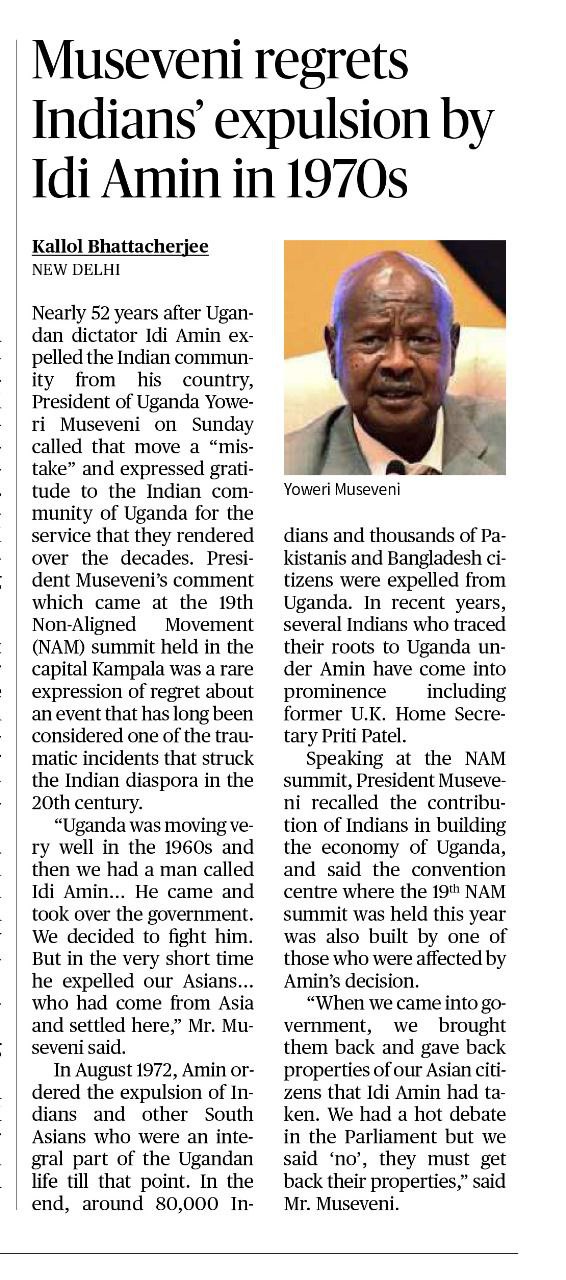News Reading Practice #49
(100 Day Challenge)
MUSEVENI REGRETS INDIANS' EXPULSION BY IDI AMIN IN 1970S
Kallol Bhattacherjee
NEW DELHI
Nearly 52 years after Ugandan dictator Idi Amin expelled the
Indian community from his country, President of Uganda Yoweri Museveni on
Sunday called that move a "mistake" and expressed gratitude to the Indian community of Uganda for the service
that they rendered over the decades. President Museveni's comment
which came at the 19th Non-Aligned Movement (NAM) summit held in the capital
Kampala was a rare expression of regret
about an event that has long been considered one of the traumatic incidents that struck the Indian diaspora in the 20th century.
"Uganda was moving very well in the 1960s and then
we had a man called Idi Amin... He came and took over the government. We
decided to fight him. But in the very short time he expelled our Asians... who
had come from Asia and settled here," Mr. Museveni said.
In August 1972, Amin ordered the expulsion of Indians and
other South Asians who were an integral part of the
Ugandan life till that point. In the end, around 80,000 Indians and thousands
of Pakistanis and Bangladesh citizens were expelled from Uganda. In recent
years, several Indians who traced their roots
to Uganda under Amin have come into prominence including former U.K. Home Secretary Priti Patel.
Speaking at the NAM summit, President Museveni recalled the contribution of Indians in building the economy of Uganda, and said the convention centre where the 19th NAM summit was held this year was also built by one of those who were affected by Amin's decision.
"When we came into government, we brought them back and gave back properties of our Asian citizens that Idi Amin had taken. We had a hot debate in the Parliament but we said 'no', they must get back their properties,” said Mr. Museveni.
_______________________________
REGRET: Feeling
sorry or remorseful about something.
EXPULSION:
Forcing someone to leave a place, often involuntarily.
DICTATOR: A
ruler with absolute power and authority, often obtained and maintained through
force.
EXPEL: Forced to
leave or removed from a place.
GRATITUDE:
Thankfulness or appreciation for something received.
RENDER: Provided
or contributed in a specific way.
REGRET: A
feeling of sadness or disappointment about something that has happened.
TRAUMATIC:
Causing emotional distress or suffering.
DIASPORA: The
dispersion or spread of people from their original homeland.
INTEGRAL:
Essential or necessary for completeness.
TRACED THEIR
ROOTS: Followed or identified their ancestral origins.
PROMINENCE:
Being widely recognized or notable.
RECALLED:
Remembered or brought back to memory.
CONTRIBUTION:
The act of giving or doing something to help achieve a common goal.
ECONOMY: The
system of production, distribution, and consumption of goods and services
within a region.
HOT DEBATE: Intense or heated discussion on a particular topic.
_______________________________





